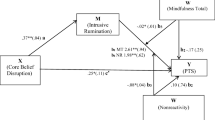Abstract
Cognitive activity, manifested as trauma-related ruminative thinking, and deficits in emotional processing are believed to perpetuate the symptoms of posttraumatic stress disorder (PTSD). The aim of this study was to determine the mediating role of rumination in the relationship between emotional processing difficulties and PTSD symptoms. Data from 60 women aged from 40 to 67 (mean 58.0; SD 6.97) with breast cancer diagnosis were analyzed. The participants completed three questionnaires: the Impact of Event Scale-Revised to assess PTSD symptoms, the Event Related Rumination Inventory to measure intrusive and deliberate rumination, and the Emotional Processing Scale to assess emotional processing deficits. The results reveal positive associations between emotional processing deficits, cancer-related rumination, and PTSD symptoms. Mediation analysis indicated that intrusive rumination plays a mediating role in the relationship between difficulties in emotional processing and PTSD symptoms. The findings highlight the role played by cognitive and emotional processes in the development and maintenance of posttraumatic stress disorder symptoms.



Similar content being viewed by others
Notes
The terms trauma-related rumination, cancer diagnosis-related rumination, and cancer-related rumination were used interchangeably in this study.
Amazonki is an association of women who have suffered from breast cancer and have undergone mastectomy.
The results above this point may be treated as the indicator of PTSD diagnosis (Juczyński & Ogińska-Bulik, 2009).
After Bonferroni correction for correlations, deliberate rumination has not been included in the mediation model.
References
American Psychiatric Association. (2013). Diagnostic and statistical manual of mental disorders, 5th edition: DSM-5. Arlington, VA: American Psychiatric Association. https://doi.org/10.1176/appi.books.9780890425596.
Baker, R., Thomas, S., Thomas, P. W., & Owens, M. (2007). Development of an emotional processing scale. Journal of Psychosomatic Research, 62(2), 167–178.
Brackett, M. A., Bertoli, M., Elbertson, N., Bausseron, E., Castillo, R., & Salovey, P. (2013). Emotional intelligence: Reconceptualizing the cognition-emotion link. In M. D. Robinson, E. R. Watkins & E. Harmon-Jones (Eds.), Handbook of cognition and emotion (pp. 365–379). New York: Guilford Press.
Bydlowski, S., Corcos, M., Jeammet, P., Paterniti, S., Berthoz, S., Laurier, C., Chambry, J., & Consoli, S. M. (2005). Emotion-processing deficits in eating disorders. International Journal of Eating Disorders, 37, 321–329.
Calhoun, L. G., Cann, A., & Tedeschi, R. G. (2010). The posttraumatic growth model: Sociocultural considerations. In T. Weiss & R. Berger (Eds.), Posttraumatic growth and culturally competent practice: Lessons learned from around the globe (pp. 1–14). Hoboken, NJ: Wiley.
Calhoun, L. G., & Tedeschi, R. G. (2006). The foundations of posttraumatic growth: An expanded framework. In L. G. Calhoun & R. G. Tedeschi (Eds.), Handbook of posttraumatic growth (pp. 1–23). Hoboken, NJ: Lawrence Erlbaum Associates.
Cann, A., Calhoun, L. G., Tedeschi, R. G., Triplett, K. N., Vishnevsky, T., & Lindstrom, C. M. (2011). Assessing posttraumatic cognitive processes: The Event Related Rumination Inventory. Anxiety Stress & Coping, 24(2), 137–156.
Chan, M. W., Ho, S. M., Tedeschi, R. G., & Leung, C. W. (2011). The valence of attentional bias and cancer-related rumination in posttraumatic stress and posttraumatic growth among women with breast cancer. Psycho-oncology, 20, 544–552.
Cordova, M. J., Riba, M. B., & Spiegel, D. (2017). Post-traumatic stress disorder and cancer. Lancet Psychiatry, 4(4), 330–338.
Cordova, M. J., Studts, J. L., Hann, D. M., Jacobsen, P. B., & Andrykowski, M. A. (2000). Symptom structure of PTSD following breast cancer. Journal of Traumatic Stress, 13, 301–309.
Cribb, G., Moulds, M. L., & Carter, S. (2006). Rumination and experiential avoidance in depression. Behaviour Change, 23, 165–176.
Devine, K. A., Reed-Knight, B., Loiselle, K. A., Fenton, N., & Blount, R. L. (2010). Posttraumatic growth in young adults who experienced serious childhood illness: A mixed-methods approach. Journal of Clinical Psychology in Medical Settings, 17, 340–348.
Echiverri, A. M., Jaeger, J. J., Chen, J. A., Moore, S. A., & Zoellner, L. A. (2011). Dwelling in the past: The role of rumination in the treatment of posttraumatic stress disorder. Cognitive and Behavioral Practice, 18, 338–349. https://doi.org/10.1016/j.cbpra.2010.05.008.
Ehlers, A., & Clark, D. M. (2000). A cognitive model of posttraumatic stress disorder. Behaviour Research and Therapy, 38, 319–345.
Ehring, T., & Ehlers, A. (2014). Does rumination mediate the relationship between emotion regulation ability and posttraumatic stress disorder? Psychotraumatology, 5, 23547. https://doi.org/10.3402/ejpt.v5.23547.
Ehring, T., & Quack, D. (2010). Emotion regulation in trauma survivors. The role of trauma type and PTSD symptoms severity. Behavior Therapy, 41, 581–597.
Ehring, T., & Watkins, E. R. (2008). Repetitive negative thinking as a transdiagnostic process. International Journal of Cognitive Psychotherapy, 1, 192–205.
Elklit, A., & Blum, A. (2010). Psychological adjustment one year after the diagnosis of breast cancer. A prototype study of delayed posttraumatic stress disorder. British Journal of Clinical Psychology. https://doi.org/10.1348/014466510X527676.
Erwin, M. C., Mitchel, M. A., Contractor, A. A., Dranger, P., Charak, R., & Elhai, J. D. (2018). The relationship between distress tolerance regulation and counterfactual rumination, and PTSD symptoms cluster. Comprehensive Psychiatry, 82, 133–140.
Foa, E. B., Chrestman, K. R., & Gilboa-Schechtman, E. (2014). Prolonged exposure therapy for adolescent with PTSD. Emotional processing of traumatic event. Sopot: GWP.
Foa, E. B., & Rothbaum, B. O. (1998). Treating the trauma of rape: Cognitive-behavioral therapy for PTSD. New York: Guilford Press.
Giorgio, J. M., Sanflippo, J., Kleiman, E., Reilly, D., Bender, R. E., Wagner, C. A., … Alloy, L. B. (2010). An experiential avoidance conceptualization of depressive rumination: Three tests of the model. Behaviour Research and Therapy, 48, 1021–1031.
Górska, D., & Jasielska, A. (2010). Conceptualization emotional processing and its measurement—study of Polish version Baker’s and colleagues Emotional Processing Scale. Psychological Studies, 48(3), 75–87.
Gurevich, M., Devins, G. M., & Rodin, G. M. (2002). Stress response syndromes and cancer, conceptual and assessment issues. Psychosomatics, 43, 259–281.
Horowitz, M. J. (1986). Stress response syndrome (2nd ed.). New York: Jason Aronson.
Janoff-Bulman, R. (1992). Shattered assumptions: Towards a new psychology of trauma. New York: The Free Press.
Juczyński, Z., & Ogińska-Bulik, N. (2009). Measurement of post-traumatic stress disorder—Polish version of Impact Event Scale-Revised. Psychiatry, 6(1), 15–25.
Kangas, M., Henry, J. L., & Bryant, R. A. (2002). Posttraumatic stress disorder following cancer: A conceptual and empirical review. Clinical Psychology Review, 22(4), 499–524.
Kenny, D. A. (2017). MedPower: An interactive tool for the estimation of power in tests of mediation [Computer software]. Retrieved from https://davidakenny.shinyapps.io/MedPower/.
Larsen, S. E., & Berenbaum, H. (2015). Are specific emotion regulation strategies differentially associated with posttraumatic growth versus stress? Journal of Aggression, Maltreatment & Trauma, 24(7), 794–808.
Lepore, S. J. (2001). A social–cognitive processing model of emotional adjustment to cancer. In A. Baum & B. L. Andersen (Eds.), Psychosocial interventions for cancer (pp. 99–116). Washington, DC: American Psychological Association.
Michael, T., Halligan, S. L., Clark, D. M., & Ehlers, A. (2007). Rumination in posttraumatic stress disorder. Depression and Anxiety, 24, 307–317.
Moore, S. A., Zoellner, L. A., & Mollenholt, N. (2008). Are expressive suppression and cognitive reappraisal associated with stress-related symptoms? Behaviour, Research and Therapy, 46(9), 993–1000.
Nolen-Hoeksema, S. (2000). The role of rumination in depressive disorders and mixed depressive/anxiety symptoms. Journal of Abnormal Psychology, 109(3), 504–511.
Nolen-Hoeksema, S., Wisco, B. E., & Lyubomirsky, S. (2008). Rethinking rumination. Perspectives on Psychological Science, 3(5), 400–424.
Ogińska-Bulik, N. (2017). Negative and positive effects of trauma resulting from cancer—The role of personality and rumination. Current Issues in Personality Psychology, 5(2), 1–12.
Ogińska-Bulik, N., & Juczyński, Z. (2015). The Polish adaptation of the Event Related Rumination Inventory. The Review of Psychology, 58(3), 383–400.
Ogińska-Bulik, N., & Juczyński, Z. (2016). Ruminations as predictors of negative and positive effects of experienced traumatic event in medical rescue workers. Occupational Medicine, 67(2), 201–211.
Preacher, K. J., & Hayes, A. F. (2008). Asymptotic and resampling strategies for assessing and comparing indirect effects in multiple mediator models. Behavior Research Methods, 40, 879–891. https://doi.org/10.3758/BRM.40.3.879.
Rachman, S. (1980). Emotional processing. Behaviour Research and Therapy, 18, 51–60.
Razik, S., Ehring, T., & Emmelkamp, P. M. (2013). Psychological consequences of terrorist attacks: Prevalence and predictors of mental health problems in Pakistani emergency responders. Psychiatry Research, 207, 80–85.
Stanton, A. L., Danoff-Burg, S., Cameron, C. L., Bishop, M., Collins, C. A., Kirk, S. S., … Twillman, R. (2000). Emotionally expressive coping predicts psychological and physical adjustment to breast cancer. Journal of Consulting and Clinical Psychology, 68(5), 875–882.
Swartzman, S., Booth, J. N., Munro, A., & Sani, F. (2017). Posttraumatic stress disorder after cancer diagnosis in adults: A meta-analysis. Depression and Anxiety, 34(4), 327–339.
Tull, M. T., Barrett, H. M., McMillan, E. S., & Roemer, L. (2007). A preliminary investigation of the relationship between emotion regulation difficulties and posttraumatic stress symptoms. Behavior Therapy, 38(3), 303–313.
Wachen, J. S., Patidar, S. M., Mulligan, E. A., Naik, A. D., & Moye, J. (2014). Cancer-related PTSD symptoms in a veteran sample: Association with age, combat PTSD, and quality of life. Psycho-oncology, 23, 921–927.
Weiss, D., & Marmar, C. (1997). The Impact of Event Scale-Revised. In J. Wilson & T. Keane (Eds.), Assessing psychological trauma and PTSD: A handbook for practitioners. New York: Guilford Press.
Wu, X., Wang, J., Cofie, R., Kaminga, A. C., & Liu, A. (2016). Prevalence of posttraumatic stress disorder among breast cancer patients: A meta-analysis. Iranian Journal of Public Health, 45(12), 1533–1544.
Zhou, X., Wu, X., Zeng, M., & Tian, Y. (2016). The relationship between emotion regulation and PTSD/PTG among adolescents after Ya’an earthquake: The mediating role of social support. Acta Psychologica Sinica. https://doi.org/10.3724/SP.J.1041.2016.00969.
Author information
Authors and Affiliations
Contributions
NO-B and PM wrote the paper and performed the statistical analyses.
Corresponding author
Ethics declarations
Conflict of interest
Nina Oginska‑Bulik and Paulina Michalska declare that they have no conflict of interest.
Ethical Approval
All procedures performed in studies involving human participants were in accordance with the ethical standards of the institutional and/or national research committee and with the 1964 Helsinki declaration and its later amendments or comparable ethical standards. This study was approved by Ethics Committee of University of Łódź. The reference number of the approval: 4/KBBN-UŁ/I/2016.
Informed Consent
Informed consent was obtained from all individual participants included in the study.
Additional information
Publisher’s Note
Springer Nature remains neutral with regard to jurisdictional claims in published maps and institutional affiliations.
Rights and permissions
About this article
Cite this article
Ogińska-Bulik, N., Michalska, P. The Relationship Between Emotional Processing Deficits and Posttraumatic Stress Disorder Symptoms Among Breast Cancer Patients: The Mediating Role of Rumination. J Clin Psychol Med Settings 27, 11–21 (2020). https://doi.org/10.1007/s10880-019-09606-6
Published:
Issue Date:
DOI: https://doi.org/10.1007/s10880-019-09606-6




